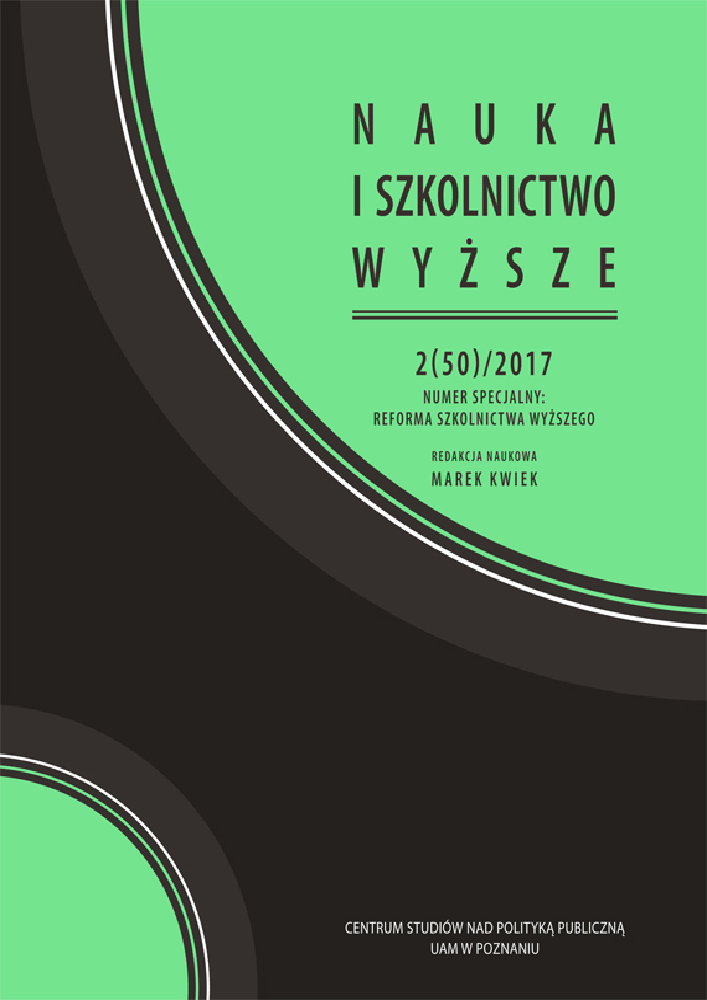Abstract
We describe how the Faculty of Mathematics, Informatics and Mechanics of the University of Warsaw (Faculty MIM for short) has been changing during the years 1991-2016. These changes were motivated by a change of the political system in Poland, affecting academic life, as well as the growing import_ance of Computer Science (Informatics). Moving MIM’s faculty to another building was a catalyst for change, giving the community a chance to reevaluate various aspects of academic life. In the new environment faculty members were treated more as individual researchers rather than employees of various organizational units. Improved working conditions helped to create a sense of community. An import_ant goal was to achieve a synergy effect resulting from the close collaboration of mathematicians and computer scientists. The faculty of MIM acted against the fragmentation of the university, which was typical of Poland during the last decade of the 20th century. It initiated a university-wide recruitment system for students, produced and introduced innovative software (University Study-Oriented System (USOS)) and paid special attention to service courses in mathematics and computer science. Long before the introduction of the Bologna system, the five-year curriculum at MIM was divided into bachelor and master programs that contained an extended range of elective courses. To meet the requirements of the quickly changing disciplines and to motivate young researchers, a flat organization structure of the Faculty was introduced. An import_ant element of a transparent Human Resources policy is a system of financial bonuses for the most active researchers and teachers. We emphasize that the global character of mathematical sciences, and the tradition of the Warsaw mathematical school, are key factors forming standards and values of the community.
Funding
Wydział Matematyki
Informatyki i Mechaniki UW
zmiana
integracja
rekrutacja
zajęcia usługowe
system boloński
USOS
mobilność
chów wsobny
współdzielenie zasobów
indywidualizacja
podmiotowość
transparentność
standardy
wynagrodzenia
References
Jackowski, S. (1990). Wystąpienie na zebraniu elektorów Wydziału Matematyki, Informatyki i Mechaniki Uniwersytetu Warszawskiego w dniu 21 XI 1990. https://www.mimuw.edu.pl/~sjack/WMIM/1990_deklarcja_SJ.pdf.
Jackowski, S. (2002). Uniwersytecki System Obsługi Studiów. Uniwersytet Warszawski: Pismo Uczelni, 1(7): 25-26.
Jackowski, S. (2004). Co Internet zmienia w tradycyjnej dydaktyce akademickiej? Nauka i Szkolnictwo Wyższe. 2(24): 135-140.
Jackowski, S., Mincer-Daszkiewicz, J. (2004). Elektroniczna immatrykulacja. Uniwersytet Warszawski: Pismo uczelni. 3(19): 20-22.
Jackowski, S., Mincer-Daszkiewicz, J. (2005). Przez Internet na studia. Forum Akademickie. 3: 41-43.
Katalog przedmiotów. https://www.mimuw.edu.pl/~sjack/katalog98/.
Madey J. (2010). Kształcenie zindywidualizowane na Wydziale Matematyki, Informatyki i Mechaniki Uniwersytetu Warszawskiego, czyli „szlifowanie diamentów”. W: T. Borecki (red.), Współpraca szkół średnich i wyższych (t. XLVIII, rozdz. 3, ss. 13-22). Warszawa: Instytut Problemów Współczesnej Cywilizacji im. Marka Dietricha.
Program „Jakość przez jawność”. https://www.mimuw.edu.pl/~sjack/WMIM/batory/.
Raport o zasobach przestrzennych w zgrupowaniu „Centrum” oraz o potrzebach przestrzennych na działalność naukową i dydaktyczną wybranych jednostek UW. http://www.mimuw.edu.pl/~sjack/opera/rapzip15.pdf.
Strategia rozwoju szkolnictwa wyższego w Polsce do 2020 roku – drugi wariant (2010). Raport cząstkowy przygotowany przez konsorcjum Ernst & Young Business Advisory oraz Instytut Badań nad Gospodarką Rynkową.
Strzelecki, P. (2016). Wydział Matematyki, Informatyki i Mechaniki UW: moja perspektywa. 5.03.2016. https://www.mimuw.edu.pl/~pawelst/wybory_2016/WMIM_w_moich_oczach.pdf.
Tarlecki, A. (2012) List do społeczności WMIM. 30.04.2012. https://www.mimuw.edu.pl/~sjack/WMIM/2012_deklaracja_AT.pdf.
Uniwersytet Warszawski, WMIM. Informator dla studentów I roku kierunku informatyka, I i II roku kierunku matematyka dziennych studiów magisterskich w roku akademickim 1995/96.
